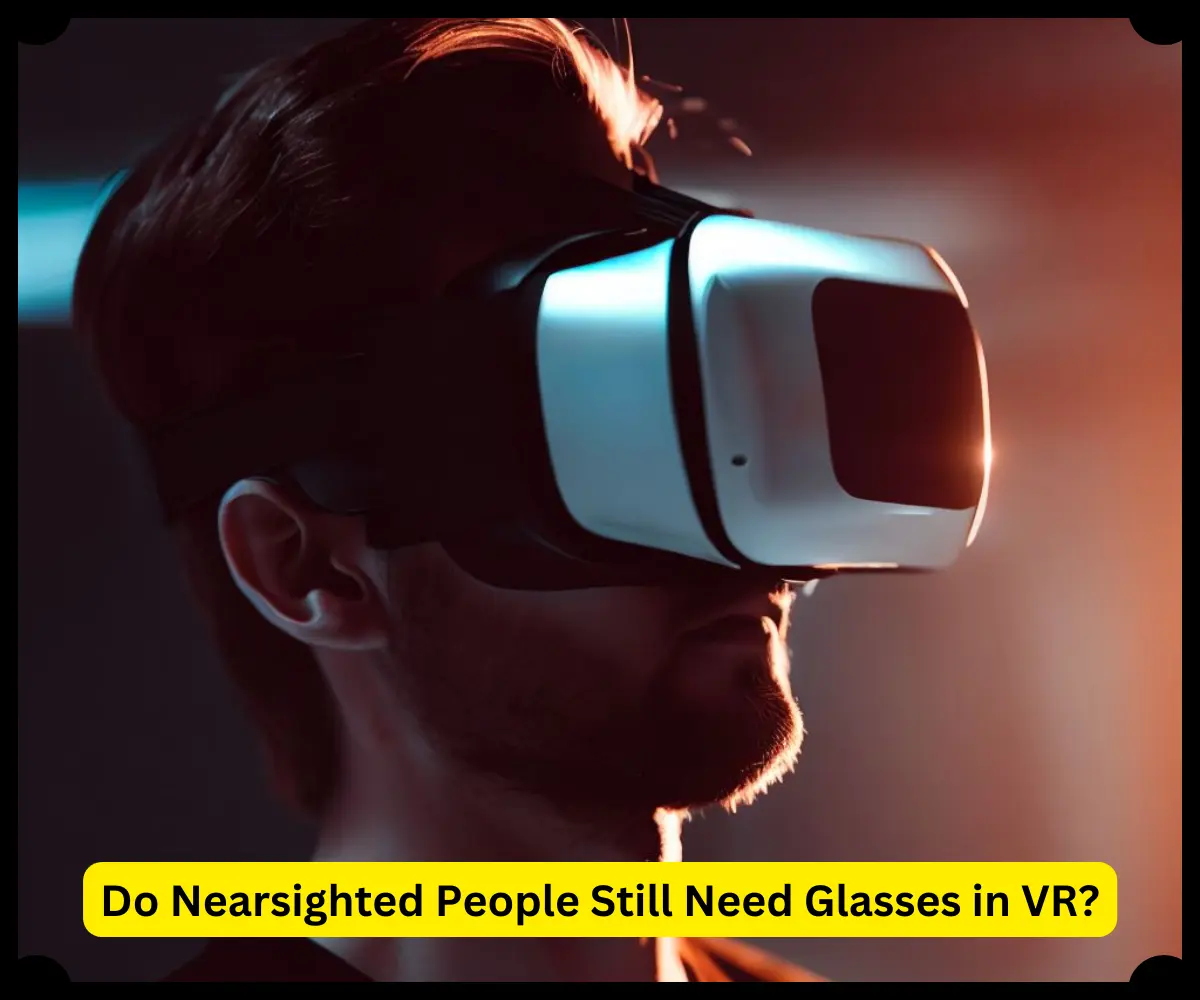Virtual reality (VR) headsets are becoming increasingly popular for gaming, entertainment, and even productivity. However, for nearsighted people, VR can be a challenge.
Do Nearsighted People Still Need Glasses in VR?
Topics Covered In This Article
- 1 Do Nearsighted People Still Need Glasses in VR?
For nearsighted people who normally wear glasses, a common question arises – Do Nearsighted People Still Need Glasses in VR?
The short answer is yes, nearsighted people do still need to wear glasses or contact lenses for the best visual experience in VR. However, the degree to which glasses are needed depends on multiple factors.
How VR Headsets Work
This set focal distance is problematic for nearsighted users who cannot focus well on distant objects. VR headsets also must render an image that provides a wide field of view and minimizes distortion. This requires high quality optics that complement the user’s visual needs.
Why nearsighted people still need glasses?
There are a few key reasons why nearsighted people still need glasses with current consumer VR headsets:
- The headsets cannot account for your specific prescription needs. The built-in optics are designed for the average user’s vision, not tailored for each individual.
- You need clear near vision to look at the VR environment up close. VR headsets only focus at fixed distances of 1 to 2 meters.
- Reduced visual accuracy in VR can cause eye strain, headaches, and poor user experience.
- Your glasses help correct astigmatism, which the VR lenses cannot fix.
In essence, the headset optics are simply not advanced enough yet to replace your glasses. Wearing your prescription lenses allows you to see VR clearly at any distance, not just far away.
Where Nearsighted Users May Not Be Required Glasses
There are certain scenarios where nearsighted users may get by without needing glasses in VR:
- If you have very mild nearsightedness, below -2.00 diopters. The VR image may look sharp enough without glasses.
- Using VR for gaming where visual acuity is less critical than immersion.
- The VR experience relies more on wide field of view rather than visual detail.
- You only use VR briefly. The eyestrain from poor focus may not bother you.
However, for any prolonged use, best visual clarity, or VR experiences requiring sharp focus, glasses are still recommended. The headset’s fixed focus cannot match your eyes’ needs.
Using Glasses in VR Headsets
Here are some tips for successfully wearing glasses in VR:
- Ensure your headset has enough space to fit glasses inside. Oversized frames may not fit.
- Adjust the headset to bring screens as close to your eyes as possible.
- Fit any spacer or gasket to provide maximum space for glasses.
- Order prescription lens inserts designed specifically for your headset.
- Use contact lenses if possible to avoid cramped glasses in the headset.
Pay attention to potential light leakage around the nose bridge and pressure on your nose from glasses. Proper headset adjustment can help minimize discomfort.
Advantages of Wearing Glasses in VR
Wearing glasses in VR provides these advantages for nearsighted users:
- Crisp, sharp focus at any viewing distance in VR, near or far.
- Avoids eye strain and headaches from sustained blurry vision.
- Allows you to fully appreciate fine visual details in the VR environment.
- Prevents nausea that can occur if VR imagery lacks proper focus.
- Provides customized correction that the headset cannot match.
By wearing glasses, you can fully immerse yourself in the VR worlds without visual distractions from your nearsightedness.
Future Options for Nearsighted VR Users
As VR technology evolves, there are a few promising options that could reduce the need for glasses:
- Adjustable focus – Headsets could allow users to tune the focal distance to their specific needs.
- Eye tracking – Headsets with integrated eye tracking could auto-adjust the image based on where you’re looking.
- Prescription lens inserts – Custom inserts shaped for your face and prescription allow glasses-free use.
Multi-focal displays capable of presenting sharp images at multiple distances could also help nearsighted users focus naturally in VR without glasses. But for now, most headsets require you to wear your glasses for optimum visual clarity and comfort.
Read: 3D Vs VR Glasses
FAQs
Can nearsighted people use VR without glasses?
It is possible but not recommended. People with mild nearsightedness below -2.00 diopters may get by without glasses in VR, but likely with some eye strain and blurry vision. For most nearsighted users, glasses are still required for clearly seeing fine details in VR and avoiding discomfort.
Will wearing glasses scratch my VR lenses?
No, wearing glasses does not damage VR headset lenses. As long as you insert and remove the headset carefully without knocking the glasses into the lenses, the VR lenses will be fine. Always clean glasses before use to avoid scratching due to dust particles. Adjust headset fit and use included spacers so glasses don’t rub on lenses.
Can I get prescription lenses for VR headsets?
Yes, various third party companies offer custom prescription lens inserts for many VR headsets. These snap directly into the headset instead of glasses. This allows glasses-free VR without compromising visual clarity or field of view for nearsighted users.
Do VR headsets work for people with astigmatism?
VR headsets can still be used by those with astigmatism, but glasses are highly recommended. The headset optics cannot correct for astigmatism – only your prescription glasses can. This prevents distorted and blurry vision that can cause dizziness and headaches in VR.
Will future VR headsets eliminate the need for glasses?
Future headsets with adjustable focus, eye tracking and multi-focal displays could potentially incorporate your prescription to work without glasses. But for now, consumer headsets lack those capabilities. As technology improves over time, glasses in VR may become optional rather than mandatory for clear, comfortable vision.
Conclusion
Nearsighted VR users gain significant visual benefits from wearing glasses. Your glasses enable you to see clearly at any distance and customize your prescription in ways the headset cannot. As headsets continue advancing with new features, glasses may someday become optional for some users. But for the best VR experience right now, nearsighted people would be wise to keep their glasses on and enjoy virtual worlds unhindered by blurry vision.
With a few adjustments for comfort, wearing glasses in VR can let you fully immerse yourself without sacrificing visual clarity. So grab your headset and glasses to explore virtual worlds with crisp focus and zero eyestrain. The future of VR looks bright, and with glasses, you’ll be able to see every detail in stunning high-definition.
Key Takeaways: Do Nearsighted People Still Need Glasses in VR
- Nearsighted people do still need to wear glasses or contacts when using current consumer VR headsets for best visual clarity.
- Glasses optimize the VR experience by allowing you to see clearly at close and far distances.
- Headset adjustments and prescription lens inserts can improve comfort when wearing glasses in VR.
- Future VR advances like adjustable focus and eye tracking may reduce the need for glasses.
So don’t ditch your glasses just yet. For nearsighted users, glasses remain a crucial part of enjoying virtual worlds to the fullest.

Walter Hendricks is a well-known authority in the eyewear industry, specializing in a diverse range of products such as gaming glasses, swimming goggles, sunglasses, eyeglasses, computer glasses, and fashionable daily-wear eyewear.
Hendricks believes in empowering his readers with in-depth information to help them choose the right glasses that blend functionality and fashion, catering to their unique lifestyle requirements.
His comprehensive reviews and informative articles provide clear insights on everything from cutting-edge gaming glasses to the latest trends in eyewear fashion. Through his work, Hendricks has proven his dedication to helping consumers make informed eyewear decisions that support both their visual needs and style preferences.

